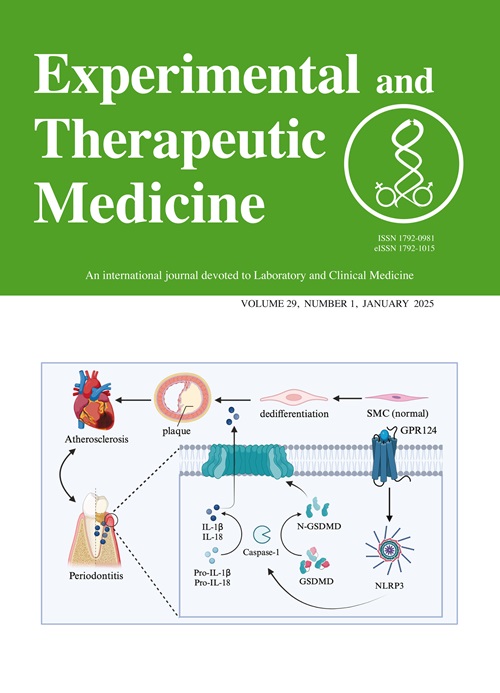Uncoupling protein 2 modulates polarization and metabolism of human primary macrophages via glycolysis and the NF‑κB pathway
IF 2.3
4区 医学
Q3 MEDICINE, RESEARCH & EXPERIMENTAL
引用次数: 0
Abstract
Metabolic abnormalities, particularly the M1/M2 macrophage imbalance, play a critical role in the development of various diseases, leading to severe inflammatory responses. The present study aimed to investigate the role of uncoupling protein 2 (UCP2) in regulating macrophage polarization, glycolysis, metabolic reprogramming, reactive oxygen species (ROS) and inflammation. Primary human macrophages were first polarized into M1 and M2 subtypes, and these two subtypes were infected by lentivirus‑mediated UCP2 overexpression or knockdown, followed by enzyme‑linked immunosorbent assay, reverse transcription‑quantitative PCR, western blotting and flow cytometry to analyze the effects of UCP2 on glycolysis, oxidative phosphorylation (OXPHOS), ROS production and cytokine secretion, respectively. The results demonstrated that UCP2 expression was suppressed in M1 macrophages and increased in M2 macrophages, suggesting its regulatory role in macrophage polarization. UCP2 overexpression decreased macrophage glycolysis, increased OXPHOS, decreased ROS production, and led to the conversion of M1 polarization to M2 polarization. This process involved NF‑κB signaling to regulate the secretion profile of cytokines and chemokines and affected the expression of key enzymes of glycolysis and a key factor for maintaining mitochondrial homeostasis (nuclear respiratory factor 1). UCP2 knockdown in M2 macrophages exacerbated inflammation and oxidative stress by promoting glycolysis, which was attenuated by the glycolysis inhibitor 2‑deoxyglucose. These findings highlight the critical role of UCP2 in regulating macrophage polarization, metabolism, inflammation and oxidative stress through its effects on glycolysis, providing valuable insights into potential therapeutic strategies for macrophage‑driven inflammatory and metabolic diseases.解偶联蛋白2通过糖酵解和NF - κB途径调节人原代巨噬细胞的极化和代谢
代谢异常,特别是M1/M2巨噬细胞失衡,在各种疾病的发展中起着关键作用,导致严重的炎症反应。本研究旨在探讨解偶联蛋白2 (uncoupling protein 2, UCP2)在调节巨噬细胞极化、糖酵解、代谢重编程、活性氧(reactive oxygen species, ROS)和炎症中的作用。首先将人巨噬细胞分化为M1和M2亚型,通过慢病毒介导的UCP2过表达或敲低感染这两种亚型,然后采用酶联免疫吸附法、反转录定量PCR、western blotting和流式细胞术分别分析UCP2对糖酵解、氧化磷酸化(OXPHOS)、ROS产生和细胞因子分泌的影响。结果表明,UCP2在M1巨噬细胞中表达抑制,在M2巨噬细胞中表达升高,提示其在巨噬细胞极化中具有调节作用。UCP2过表达降低巨噬细胞糖酵解,增加OXPHOS,减少ROS产生,导致M1极化向M2极化转化。这一过程涉及NF - κB信号调节细胞因子和趋化因子的分泌谱,并影响糖酵解关键酶和维持线粒体稳态的关键因子(核呼吸因子1)的表达。M2巨噬细胞中UCP2的下调通过促进糖酵解而加重炎症和氧化应激,糖酵解抑制剂2 -脱氧葡萄糖可减弱这一作用。这些发现强调了UCP2通过其对糖酵解的影响在调节巨噬细胞极化、代谢、炎症和氧化应激中的关键作用,为巨噬细胞驱动的炎症和代谢疾病的潜在治疗策略提供了有价值的见解。
本文章由计算机程序翻译,如有差异,请以英文原文为准。
求助全文
约1分钟内获得全文
求助全文
来源期刊

Experimental and therapeutic medicine
MEDICINE, RESEARCH & EXPERIMENTAL-
CiteScore
1.50
自引率
0.00%
发文量
570
审稿时长
1 months
期刊介绍:
 求助内容:
求助内容: 应助结果提醒方式:
应助结果提醒方式:


